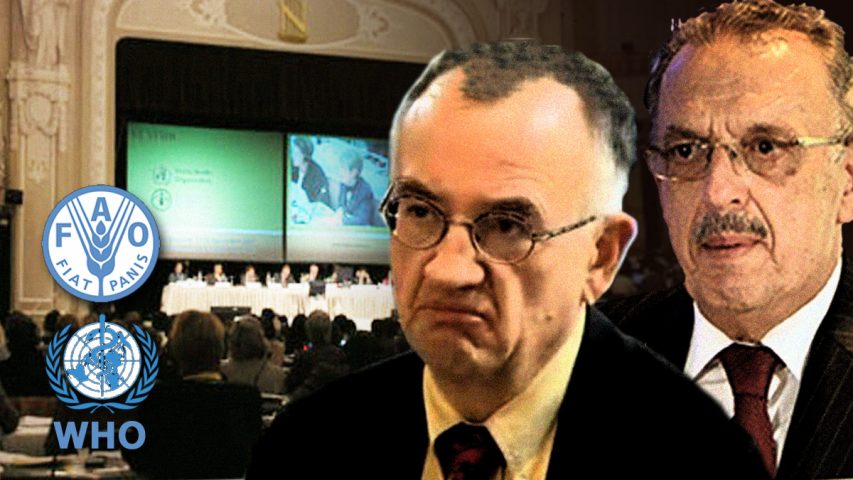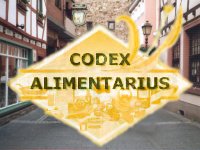- Have any questions? Contact us!
- info@dr-rath-foundation.org

Auschwitz Survivors Propose Constitution for New Europe
November 13, 2007
Exposing the cholesterol fraud
January 21, 2008CODEX ALIMENTARIUS: The control and denial of science

We don’t want to change. Every change is a menace to stability. That’s another reason why we’re so chary of applying new inventions. Every discovery in pure science is potentially subversive; even science must sometimes be treated as a possible enemy.

The 29th session of the Codex Committee on Nutrition and Foods for Special Dietary Uses was held in Bad Neuenahr-Ahrweiler, Germany, from 12 to 16 November 2007. The activities of this Committee are increasingly perceived by natural health advocates as one of the biggest global threats to the future availability of therapeutic vitamin supplements and other micronutrient-based natural health therapies. The Dr. Rath Health Foundation’s External Relations Director, Paul Anthony Taylor, attended the meeting as a delegate of the National Health Federation, the only consumer-orientated pro-natural health organization in the world to have official observer status at Codex meetings. Paul’s eye-witness report, below, describes how Codex continues to deny the health benefits of vitamins, micronutrients and nutrition in the battle against today’s most common diseases and explains how its key beneficiaries are the large multinational food, biotech and pharmaceutical corporations.
The blatant dismissal of consumers’ concerns regarding genetically modified foods

The Codex Committee on Nutrition and Foods for Special Dietary Uses, meeting in Bad Neuenahr-Ahrweiler, Germany, November 2007.
There can surely be little doubt that consumers are overwhelmingly opposed to eating genetically modified foods. Time and again, surveys and polls in countries throughout the world have proven this beyond any reasonable doubt. Nevertheless, the fact that genetically modified seeds can be patented – because, unlike regular seeds, they are created in laboratories and do not exist in nature – continues to make them a highly attractive investment proposition to the biotech and pharmaceutical companies that produce them. Patents on genetically modified seeds, and the multi-billion dollar potential profits and market control that may result from them, are acting as powerful incentives for these manufacturers to find ways of forcing such foods onto consumers’ dinner plates, regardless of the possible dangers to human health.
Notably, therefore, this year’s meeting of the Committee was attended by Dr. H. Yoshikura, the Chairman of the Codex Intergovernmental Task Force on Foods Derived from Biotechnology, a group that has already produced several global guidelines on genetically modified foods. The Task Force’s creation of these guidelines subsequently became instrumental in the United States, Canada and Argentina launching, and winning, a trade dispute at the World Trade Organization against the European Union (EU), where they successfully argued that the EU had been applying a moratorium on the approval and importation of foods containing genetically modified material and that this was contrary to WTO rules.
Yoshikura had been invited to attend this Codex meeting because the Task Force has recently been working on an annex to a global guideline for foods that have been genetically modified to (supposedly) provide nutritional or health benefits. Because the text of this annex contains references to concepts related to nutrition, the Committee was invited to review the draft annex and to provide comments on it.
Aside from making a few minor comments, however, the Committee decided to endorse the text of the annex without making any changes to it whatsoever.
In response to this, and noting that not one single country had spoken out to defend the interests of consumers regarding this issue, the National Health Federation made the following statement:

Dr. Rolf Grossklaus, the Chairman of the Codex Committee on Nutrition and Foods for Special Dietary Uses, claims that consumers do not realise the benefits of genetically modified foods and that they will in time change their minds about them.
“Mr Chairman, the NHF would like to put on the record that while the issue of risk assessment of foods derived from biotechnology is being discussed, 95% of European consumers and millions of consumers from other parts of the world have continued to indicate their rejection of such foods. We would like to know therefore how the Task Force aims to balance the need to undertake exposure studies on representative human populations when so many people reject these foods outright?”
In other words, the Federation was asking how the Task Force was planning to carry out human safety studies of genetically modified foods when so few people are prepared to eat them.
The Committee’s Chairman, Dr. Rolf Grossklaus, gave a breathtakingly dismissive response to this question and, unwilling to admit that comprehensive human exposure studies would not be carried out before these foods are marketed, he stated that these aspects could not be discussed at this meeting. Astonishingly, however, he then went on to claim that consumers do not realise the benefits that these foods provide and that he believes consumers will in time change their minds about them.
Later, at the end of the week, during the meeting to adopt the Committee’s official report, I requested, on behalf of the National Health Federation, that the report should make mention of the Federation’s statement regarding this matter. Dr. Grossklaus refused to allow this however, arguing that the issue was not discussed and that including mention of all issues that were not discussed would make the report too long.
All in all, therefore, this was arguably the most blatant example of the concerns of consumers being dismissed in a Codex meeting that I have ever witnessed.
Recommendations on the scientific basis of health claims – designed for the large multinationals

Mr Gert Lindemann, State Secretary of the Federal Ministry of Food, Agriculture and Consumer Protection, Germany, addressing the committee at the opening of the meeting.
Another key issue discussed at this year’s meeting was a text dealing with Recommendations on the Scientific Basis of Health Claims.
In recent years, the Committee has given very little time and no substantial debate to this agenda item at its meetings. However, although a more in-depth discussion did take place at this year’s meeting, the general thrust of the debate made it clear that, without a drastic change in direction, the key beneficiaries from these Recommendations will be the large multinational food, biotech and pharmaceutical corporations, who will most easily be able to afford the substantial financial costs of jumping through the various scientific and regulatory hoops that the Committee is erecting.
As a result, therefore, it seems likely that we will increasingly see breakfast cereals, genetically modified foods and pharmaceutically-manufactured RDA vitamin products carrying health claims, for example, whilst supplements produced by small, innovative vitamin manufacturers – assuming that they are not regulated out of existence – will probably not do so.
That said, however, and despite the longer debate time for this agenda item at this year’s meeting, only minimal progress was made and several key questions – including defining the necessary level of scientific evidence for the substantiation of health claims – remain outstanding. If the Committee were to insist on human studies and clinical trials, for example, even some common health claims for foods such as fruits and vegetables would have to be banned on the grounds that they were based on observational studies and epidemiological research, which would clearly be an absurd state of affairs.
With the discussions essentially having reached an impasse, therefore, the Committee agreed that the text should be returned to Step 2 of the 8-Step Codex approvals process, to be rewritten by the delegation of France in light of the discussions that had taken place. As a result, the Recommendations on Health Claims now seem unlikely to be approved and finalized by the Codex Alimentarius Commission until July 2010, at the earliest.
Nutritional risk analysis – making up the rules as they go along
A further topic that has been given very little discussion time at recent meetings of this Codex Committee is that of nutritional risk analysis. As regular Codex-watchers will already be aware, this issue has enormous relevance to the future development of the restrictive Codex Guidelines for Vitamin and Mineral Food Supplements, as the Guidelines state that the upper safe levels of vitamins and minerals in supplements will be established by scientific risk assessment.
Whilst the pro-pharmaceutical lobby – most especially including the anti-supplement extremists within the European Commission – are desperately trying to reassure everybody that the use of risk assessment will ensure that upper safe levels for vitamins and minerals will be calculated scientifically, the reality is that most current methodologies for assessing the supposed “risk” of consuming nutritional supplements are anything but scientific, and are actually deeply flawed.
Interestingly, therefore, during this year’s discussions, the representative from the World Health Organization (WHO) indicated that WHO and the Food and Agriculture Organization of the United Nations (FAO) should be the primary if not only source of scientific advice to the Committee, arguing that international expert groups might not provide independent and unbiased scientific advice. Setting aside the issue as to whether WHO and FAO themselves can be considered to be independent and unbiased, as the discussions progressed it became increasingly clear that the vast majority of the Committee was not remotely interested in obtaining independent and unbiased scientific advice in this area.

Basil Mathioudakis, the European Commission’s senior representative at the meeting. Anti-supplement extremists within the European Commission are disingenuously claiming that the upper safe levels for vitamins and minerals in food supplements will be calculated scientifically.
For example, at one point during the discussions, the National Health Federation specifically requested that a key section of the text should refer to “independent sources of scientific advice” on risk assessment. Significantly, however, Basil Mathioudakis, of the European Commission, stated that he was opposed to the use of the word “independent” in the text and, as a result, it was not included.
In a further key intervention, the National Health Federation wanted language inserted to recognize the nutrient depletion in soils and foods that has taken place over the past fifty years or so. Upon hearing this, however, the Chairman, Dr. Grossklaus, responded by saying that the institute he works for, the German Federal Institute for Risk Assessment, has made a statement on this issue to the effect that there is no scientific evidence to support this claim. In typical fashion, he then attempted to move straight on and did not give the Committee so much as a moment’s opportunity for comment.
The National Health Federation then made an additional intervention, asking that its comments be noted in the report and, ideally, considered by the Committee so that the record could be accurate and complete. Dr. Grossklaus declined to allow this however, saying that since the Federation is a non-governmental organization, and that no Member State supported its position, its comments could not go into the report.
Just as he has done in previous years, therefore, Dr. Grossklaus was once again making up the rules as he went along. This is particularly well illustrated by the fact that paragraph 131 of the Committee’s official report for this meeting makes mention of another National Health Federation intervention and that this was not supported by any Member State either.
At the close of these discussions, the Committee decided that it had made significant progress and that it should recommend to the Codex Alimentarius Commission that the text (the Proposed Draft Nutritional Risk Analysis Principles and Guidelines for Application to the Work of the Committee on Nutrition and Foods for Special Dietary Uses) be advanced to Step 5. As such, only relatively minor changes will now be possible at next year’s meeting of the Committee, and it could now potentially be approved and finalized by the Codex Alimentarius Commission in July 2009.
Proposals for nutrient reference values – out of touch with the latest science
Viewed in light of the latest and most up-to-date research in the area of nutrition, it seems safe to predict that the Committee’s current approach to the setting of nutrient reference values for labeling purposes may well be judged by future nutritional historians as being almost farcically anachronistic.
For example, the science of genetics has already taught us that we are all genetically unique and we now have convincing evidence that factors such as age, sex, contraceptive use, race, dress code, geographical location, regular blood donation, medicinal drug use, genetic mutations or biochemical individuality can affect a person’s nutrient needs and/or status, sometimes dramatically so.
However, rather than protecting the health of consumers, which is after all one of the stated purposes of Codex, the Committee is proposing instead to simply set one single reference value for each vitamin and mineral, and to apply these to the entire world population from the age of three years and upwards. Then, after work on this is complete, a further set of vitamin and mineral reference values, to apply to children aged between six months and three years, would be developed.
As such, it would seem that the Committee’s intention is essentially to provide a ringing endorsement of the existing outdated and scientifically invalid recommended daily allowance concept.
Notably, therefore, although the National Health Federation attempted to intervene in this monumentally myopic error, by proposing the establishment of an additional reference value for each vitamin and mineral, to represent the population group with the greatest need for it, the Chairman overruled it, but without giving any valid scientific reason.
Clearly then, whilst the Committee’s proposals on nutrient reference values are still admittedly at an early stage, anyone hoping for an outcome that reflects the latest science or that promotes optimum nutrition would currently be well advised not to hold their breath.
Still waiting for the ‘Stunning Victory’ at Codex? You’re not alone…
Natural health advocates with good memories may recall the so-called Natural Solutions Foundation, in its report on a meeting of the Codex Committee on Food Labeling that took place in May 2006, claiming that the outcome of discussions regarding the proposed role of Codex in the implementation of the World Health Organization’s Global Strategy On Diet, Physical Activity and Health were a “Stunning Victory” for health freedom.
Well, this certainly wasn’t true then and it still isn’t now, especially if the outcome of discussions at this meeting were anything to go by. Eighteen months after the claimed “Stunning Victory”, whilst Codex is still talking about the Global Strategy, there’s no sign of any significant action.
For example, although the Chairwoman of the Codex Committee on Food Labeling, Dr. Anne MacKenzie, gave a PowerPoint presentation on the subject of the Global Strategy, asking what mechanisms were available for inter-committee communication and cooperation, and proposing to seek guidance from WHO and FAO, her valiant contribution was relegated to a relatively minor position in the Committee’s agenda, under “Other Business and Future Work.”
After the somewhat unfocussed and confusing discussion that followed, during which even a representative of the Codex Secretariat, Dr. Jeronimas Maskeliunas, admitted to being “completely confused” as to what the Committee was talking about, it was eventually agreed that a Working Group should meet to discuss the Global Strategy immediately prior to next year’s meeting of the Committee and, after its discussions, that it should report back to the Committee. Yet more talk, in other words, and still no sign of any action.
At this current juncture, therefore, Codex discussions regarding the World Health Organization’s Global Strategy On Diet, Physical Activity and Health would appear to be light years away from turning into any sort of victory, let alone a stunning one.
Conclusion
Like the World Controllers in Aldous Huxley’s ‘Brave New World’, the Codex Alimentarius Commission doesn’t want to change. From its perspective, change – in the form of a new global healthcare system based on scientific breakthroughs in the areas of vitamin research and cellular health – is a menace to the financial stability of the pharmaceutical industry. As a result, groundbreaking discoveries in nutritional therapeutics are increasingly seen as subversive and treated as an enemy to the ‘business with disease’.
However, the lies and deceit that are necessary to maintain this situation are not sustainable in the long term. Whether Codex likes it or not, change will eventually come and, when it does, consumers will overwhelmingly demand that those who had knowingly tried to prevent their access to therapeutic vitamin supplements and other natural therapies should be called to account for their actions.
In the meantime, however, whilst cardiovascular disease, cancer, AIDS and other common diseases will undoubtedly be largely unknown to future generations, it is our responsibility to ensure that this comes about sooner rather than later.
The treatment of diseases with patented synthetic chemical drugs, when safer and more effective natural treatments are already available, borders on insanity and should no longer be tolerated in any civilized society worthy of the name. As such, the sooner the pharmaceutical industry’s ‘business with disease’ is confined to the dustbins of medical history, where it belongs, the better for all mankind.



